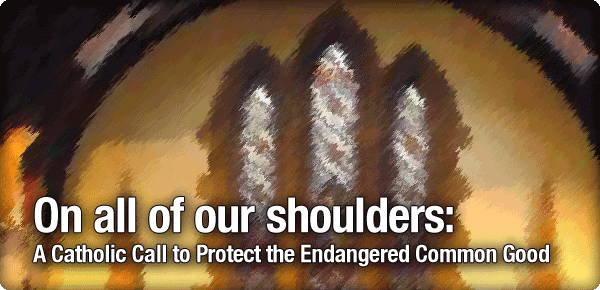Now that the election season is over in America, it might be a good time to take a step back and take a longer, more substantive look at some of the principles of Christian social thought than is sometimes possible in the midst of soundbites and stump speeches. Given the religious makeup of the candidates at the top of the tickets, Catholic Social Teaching (CST) was the focus of some attention in the national political conversation. It’s been noted that the political overlays onto religious faith are often just as constricting and reductive as partisanship itself. As Robert Joustra has observed, “Isn’t it ironic that the ecclesial conversation is essentially a thinly-baptized version of exactly the same disagreements in the secular world, but with less technical capacity and more theological abstraction?”
This is in some sense what has happened to principles of CST like subsidiarity and solidarity.
If it is at all possible, a Muslim hopes to live in a society where Islamic norms, morality and etiquette flourish, and where they cannot be publicly violated. Similarly, if it is at all possible, provided that he does not perpetuate further harm, every Muslim should command the right and forbid the wrong.

Understanding the relationship between morality and religion has preoccupied humanity’s best and brightest for millennia (think Plato, Aquinas, Kant, Nietzsche). Today, fascination with questions of morality and religiosity is no longer confined to philosophers, theologians and religion scholars. Research into the various ways that religion might influence moral identity is underway across a variety of subject disciplines in the human, natural and social sciences, capturing the interest of biologists, geneticists, neuroscientists, psychologists, anthropologists, and sociologists. Such research is highly necessary. The vast majority of the seven billion people on the planet identifies as religious. Most adopt at least some social and cultural norms and practices that reflect their religious identities. Across the globe, countless moral choices, great and small, are made on the basis of religious faith….

Jesus is our model for ethical, powerful speech. As we immerse ourselves in the Jesus community, and recognize that much of what passes for legitimate, “free speech” in our culture, is actually not coming out of community at all, but coming out of a place of isolation and alienation. Or, perhaps, coming out of an anti-Kingdom community, a community being formed by values opposed to the kingdom that Jesus proclaimed.
With this sort of starting point, we take an altogether different approach: our task, short of the full in-breaking of the Kingdom of God, can never be any partisan agenda. This is because anything short of the full consummation of the Kingdom of God will necessarily still be tainted, or worse, corrupted, by sin. All political activism then—in the sense of being active in talking to the contemporary powers-that-be in western culture—is always and necessarily ad hoc, never utopian, and never idealistic. We deal with each concrete question and issue as it arises, and seek to bear faithful witness as best we are able.
A critical issue left unaddressed in Bass’s response to Douthat is the state of power relations within mainline Protestant denominations. In her well-intentioned attempt to counteract the corrosive and controlling ‘narrative of decline’ that plagues mainline Protestant communities, she inadvertently diverts attention away from the reality that the majority of their leadership positions and financial resources are firmly in the control of the Baby Boomer generation….
